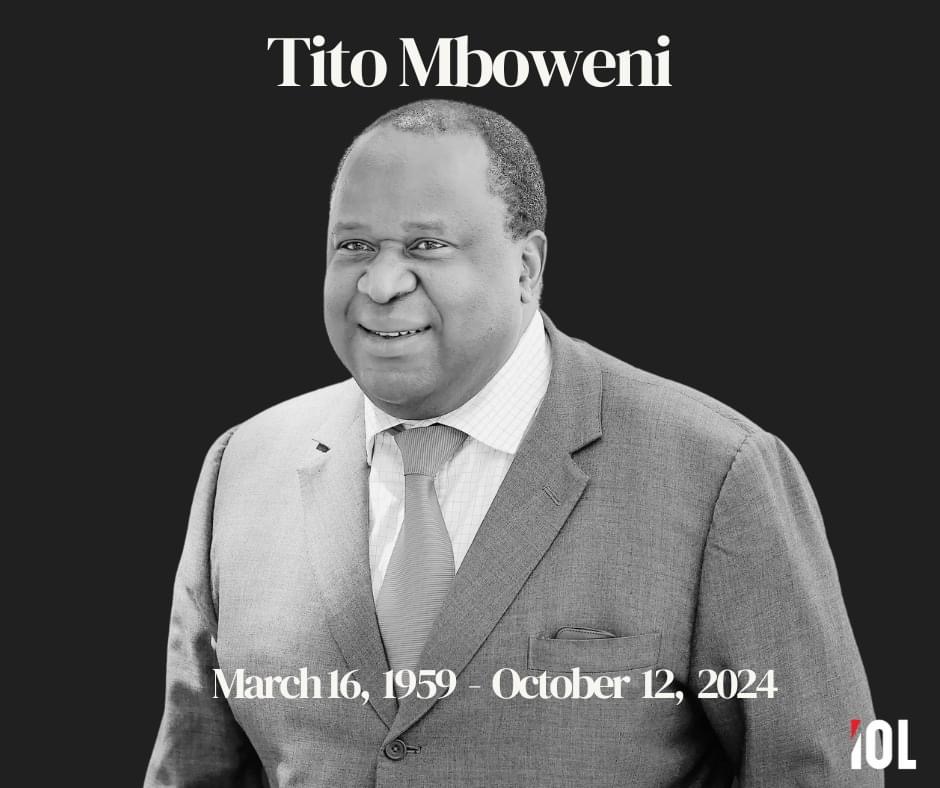
* Tito, as some of us fondly called him, was an established hero and role model as we were developing our careers as economists in the 1990s
* During that time, South Africa was in the period of transformation of both the economic and political landscape and key to this became the economic policy environment
By Duncan Mlanjira
The passing on of former Reserve Bank of South Africa Governor, Tito Titus Mboweni, brings a lot of sadness to Don Consultancy Group (DCG) Chief Economist, Chifipa Mhango — but with it rests some fond memories of personal engagements he had with the revered economic expert.
Born on March 16, 1959, Tito Mboweni passed on on Saturday, October 12. He served as South Africa’s Minister of Finance in President Cyril Ramaphosa government from 2018 to 2021.

With President Ramaphosa
He was the eighth Governor of South Africa Reserve Bank and the first black South African to hold the post from 1999 to 2009 and went on to be sworn in as Minister of Finance on October 9, 2018, following Nhlanhla Nene’s resignation.
Mboweni was a founding member of Mboweni Brothers Investment Holdings and a former international advisor of Goldman Sachs International. He had also been appointed a non executive Director for South Africa at the New Development Bank (BRICS).
Mboweni’s contribution towards South Africa’s economy has been lauded by many and the DCG Chief Economist, Chifi Mhango took up a personal angle, saying: “Tito, as some of us fondly called him, was an established hero and role model as we were developing our careers as economists in the 1990s, to be specific from 1994.

Chifipa Mhango
“During that time, South Africa was in the period of transformation of both the economic and political landscape — and key to this, became the economic policy environment.”
“So many issues were at stake, one being the labour and the other being monetary policy and trade policy moving away from import substitution to an export-oriented approach.”
Under this transition, Chifi elaborated that “the political office required men and women of stamina and clout in knowledge, to which Tito stood out as one of those young leaders in 1994, under President Nelson Mandela’s government.”

Advertisement
Chifi explained that in the period of 1995 to 1996, he was pursuing his Master’s Degree in Economics at Stellenbosch University and his point of reference to Tito Mboweni will always be on monetary policy, when the country was implementing an inflation rate targeting policy.”
“I personally didn’t have issues around the inflation rate targeting policy but rather how it was being managed and I then wrote an article that was published in City Press newspaper on May 18, 2008, entitled; ‘Monetary policy must be debated’ to encourage debate around this topic.”
Mhango further said his motivation was driven by the fact that the South African economy was coming from the period of trade isolation but also a banking system that did not serve the entire population, despite 14 years into democracy.

“My engagement with Honourable Tito Mboweni, with all accolades to define a humble man that I called Governor, was to engage over my article through a luncheon, and our conversation moved to food, which brought me to realise that this Honourable man had elements of detail, for he wanted to understand the recipe in his food order.
“Whether that had health dynamics conscious or just passion is something I could not conclude then. As we moved to the real essence of our luncheon, which was my article, the Honourable Tito Mboweni, only comment was, I liked your article.
“He then went further to say ‘please encourage others to participate in the policy debates around the future of the South African economy — this task is not a one man show’.”

Mhango added that the complement to his article and the advice from the revered economist, completely disarmed him because in his initial preparation he had prepared himself to engage on his article motivation.
“It was from Honourable Tito Mboweni that I was further motivated to be an economist and continue to share views that are to the progression of the African economies in a manner that is supported by facts and accurate data.“
“May the soul of the Honourable Governor, Tito Mboweni rest in power.”
A report by South African Broadcasting Station (SABC) quotes that country Parliament as saying Tito Mboweni was instrumental in establishment of laws of the country.

With President of Rwanda, Paul Kagame
Reads the report: The National Legislature has reflected on Mboweni’s contribution to the law making processes after the dawn of democracy. Parliament’s spokesperson Moloto Mothapo says: “After the dawn of democracy, he was the first minister of labour under the then presidency of President Nelson Mandela.
“In this role, he was instrumental in shaping South Africa’s labour policies during a critical time of transition, ensuring that the rights and dignity of workers are protected and enshrined in the new democratic order.”
“As one of the first generation of members of parliament, during the first post-apartheid parliament, Dr. Mboweni contributed to the establishment of laws and policies aimed at dismantling the legacy of apartheid and building a more inclusive and just society.”
The Presiding officers in Parliament paid tribute to Mboweni describing him as a distinguished and versatile servant and Mothapo said: “The speaker of the National Assembly as well as the chairperson of the National Council of Provinces have expressed their heartfelt condolences on the passing of Dr Tito Mboweni.”
“He was a distinguished and versatile servant who dedicated his life, passion and vast expertise to the service of the people of South Africa. Dr Mboweni’s served both the struggle for freedom and consolidation of democracy in our country as a dedicated anti-apartheid activist; he passionately fought for justice equality and liberation of South Africans laying the groundwork for the democratic values that he championed in public service.”

‘Duke of Makgobaskloof’
One of his close friends, Anglican Archbishop Thabo Makgoba expressed shock at his passing, saying he often spent time with Mboweni when visiting Makgobaskloof in Limpopo.
He says Mboweni delivered the annual Archbishop Thabo Makgoba Lecture about a month ago at the University of Limpopo where it celebrated 10 years of partnership with the university and the university’s 65 years of existence.
Makgoba has extended condolences to the Mboweni family: “I was shocked and pained to hear of the death of governor Tito Mboweni, whom we fondly call the Duke of Makgobaskloof.
“Each time we were in Makgobaskloof, we were humbled and privileged to meet either in town, little town of Hinesburg or in Makgobaskloof hotel or other places in the beautiful valley.
About a month ago, we spent quality time at the University of Limpopo where he delivered the Archbishop,” Archbishop Thabo Makgoba said.

‘Comrade Tito Mboweni leaves this earth without any scandal of corruption’
SABC also reported of deep eulogies over the passing on of Mboweni in which Lobby Group activists’ spokesperson Dennis Bloem said South Africa has lost a person who had served the country with dedication.
“He was loyal, principled and hardworking,” Bloem is quoted as saying. “Comrade Tito Mboweni leaves this earth without any scandal of corruption. I know that comrade Tito Mboweni hated corruption with passion. His only goal was to see the lives of people getting better.
“Comrade Tito Mboweni was a good-hearted human being, very humble. We convey our heartfelt condolences to Comrade Tito Mboweni’s family, friends and his political home the ANC. May his soul rest in peace.”
South African Federation of Trade Unions’ (SAFTU) general secretary, Zwelinzima Vavi is quoted as saying “workers will always be indebted to Mboweni as all the labour rights were negotiated under him”.

Advertisement
“Today many workers take for granted that they have the Basic Conditions of Employment Act that gives them right to maternity leave, to have overtime pay for Sunday, Saturday, to have lunch and tea breaks, have a right to overtime.
“All of this would have been very difficult to achieve if we didn’t have have a sympathetic Minister of Labour, the very first Minister of Labour post-apartheid.
“We will forever be indebted to him. Of course, he didn’t only pioneer the introduction of the Basic Conditions of Employment Act, this very Labour Relations Act, the Mine Health and Safety Act, that gives workers the right to refuse to do dangerous work, the occupational Health and Safety Act, the Employment Equity Act.
“You can name them all — all of those were negotiated during the era when the Minister of Labour was Tito Mboweni,” Vavi told SABC.




Advertisement
